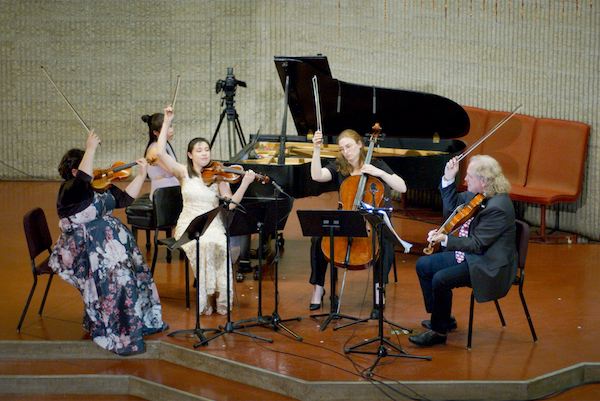Concert Review: Chameleon Arts Ensemble — Animated by The Bard
By Aaron Keebaugh
Chamber music inspired by Shakespeare is responsible for one of the high points of the Chameleon Arts Ensemble’s current season.

The Chameleon Arts Ensemble performing Elgar’s Piano Quintet in A. Photo: Dave Jamrog
The Chameleon Arts Ensemble shed light this past weekend on a series of lesser-known chamber works under the poetic sway of William Shakespeare.
In every case, music by David Matthews, Thomas Adès, and Erich Korngold confirmed that the Bard remains as fresh a voice as ever. Coupled with a folk song arrangement by Ralph Vaughan Williams and a piano quintet by Edward Elgar, Sunday’s concert at Boston’s First Church culminated in one of the high points of the ensemble’s current 25th season.
Matthews and Adès each scored Shakespearean scenes with a combination of eerie distance and dramatic flair. The former’s Terrible Beauty, written for soprano and chamber ensemble, relays its sensuous imagery through an ironic detachment that feels almost Brittenesque. Matthews does this by creating a sound world of unsettling stasis. Harmonies don’t so much flow as stick together in bristly dissonances before lines scatter in all directions.
The piece’s text comes from Homer’s Iliad and Act 2 of Shakespeare’s Antony and Cleopatra and it conveyed the Egyptian queen’s allure as it banged home Antony’s vow never to abandon her.
Sunday’s performance explored the full range of the scene’s unyielding sexual tensions. Soprano Mary Mackenzie sang colorfully, maneuvering between bold declamation and lines spiced with subtle vocal tosses. In describing Cleopatra lounging on her barge, Mackenzie sang with unexpected vibrancy, which the ensemble matched with similar conviction.
Adès’s “Court Studies” from his opera The Tempest involved a richer array of comedy and mystery.
Scored for clarinet, violin, cello, and piano, this attractive composition unfolds via a tittering chatter. The music barely resolves during its brief five minutes. But, when it does, the effect is delightfully odd without being otherworldly. The Chameleon musicians teased out its fiery pomp and fleeting delicacy.
Korngold’s Suite from Much Ado About Nothing explored verse of greater levity. This truncated set of miniatures for violin and piano was taken from the composer’s incidental music for a 1920 production of Shakespeare’s comedy. Its short movements are vividly descriptive. Violinist Claire Bourg and pianist Miki Sawada worked in tandem, digging into the radiant graces of “Maiden in the Bridal Chamber” and the sweeping harmonic beauties of the “Garden Scene.” The march of “Dogberry and Verges” coursed with impish glee, while the concluding hornpipe erupted in a festive swagger.
Vaughan Williams’s Six Studies in English Folk Song delivered the afternoon’s most affecting moments. More of an arrangement than a fully fleshed out composition, this set supplies its melodic splendors through conventional scoring for cello and piano. But Sunday’s rendition by English hornist Nancy Dimock and pianist Mika Sasaki was anything but routine. The performers revealed the music’s full pastoral glow: the pieces flowed naturally under Dimock’s fingers, her warm oaken tone and tasteful rubato shaping each line into elegant curves. “Lovely on the Water” and “Van Diemen’s Land” were fittingly haunting.
“She borrowed some of my mother’s gold” rose and fell like deep breaths with support from Sasaki’s cascading figures. “As I walked over London Bridge” concluded the set with dance-like zest.
For Elgar’s Piano Quintet in A, the Chameleon ensemble seesawed between solemnity and exuberance. The largest of three chamber works that the composer wrote at a Sussex cottage during the summer of 1918, the quintet never quite settles into a reassuring equilibrium. Moods change fitfully — from tempestuous urgency to sunlit passages — as the piece dips in and out of a volatile din.
The Chameleons performed with a spaciousness that never quelled forward momentum. Throughout the concert they explored every radiant line, orchestral-like texture, and stormy aside with boldness and graceful humor. The result was about as Shakespearean as one can get.
Aaron Keebaugh has been a classical music critic in Boston since 2012. His work has been featured in the Musical Times, Corymbus, Boston Classical Review, Early Music America, and BBC Radio 3. A musicologist, he teaches at North Shore Community College in both Danvers and Lynn.
